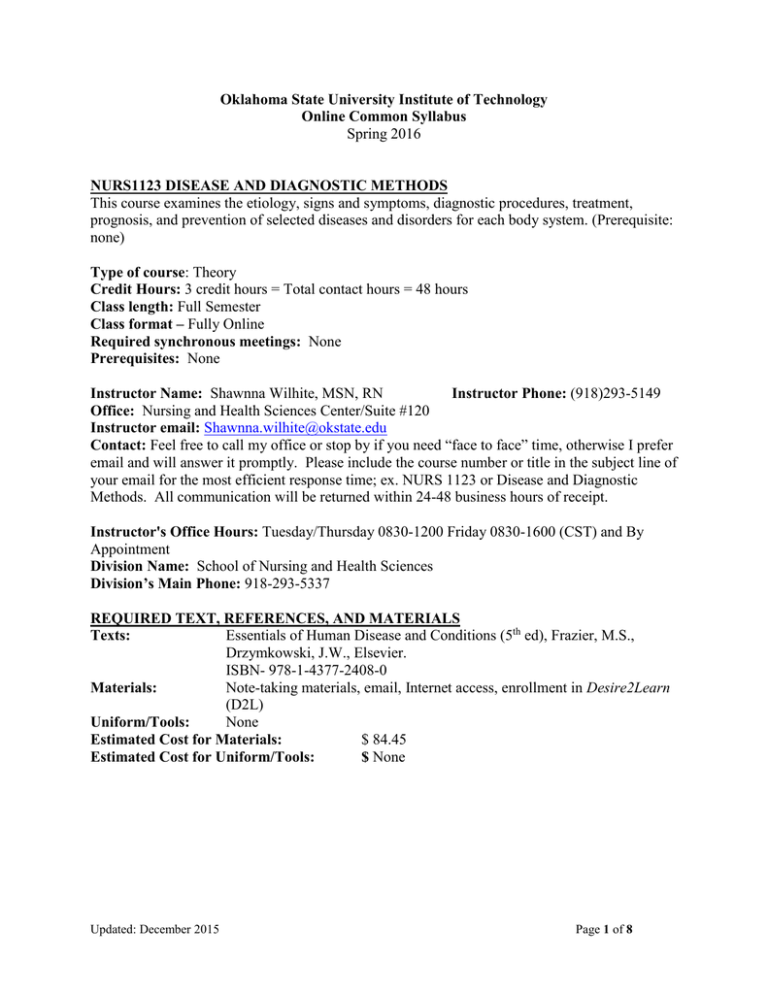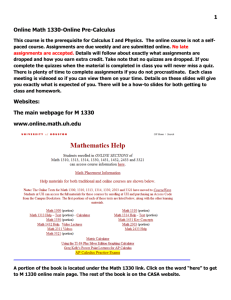Online Common Syllabus
advertisement

Oklahoma State University Institute of Technology Online Common Syllabus Spring 2016 NURS1123 DISEASE AND DIAGNOSTIC METHODS This course examines the etiology, signs and symptoms, diagnostic procedures, treatment, prognosis, and prevention of selected diseases and disorders for each body system. (Prerequisite: none) Type of course: Theory Credit Hours: 3 credit hours = Total contact hours = 48 hours Class length: Full Semester Class format – Fully Online Required synchronous meetings: None Prerequisites: None Instructor Name: Shawnna Wilhite, MSN, RN Instructor Phone: (918)293-5149 Office: Nursing and Health Sciences Center/Suite #120 Instructor email: Shawnna.wilhite@okstate.edu Contact: Feel free to call my office or stop by if you need “face to face” time, otherwise I prefer email and will answer it promptly. Please include the course number or title in the subject line of your email for the most efficient response time; ex. NURS 1123 or Disease and Diagnostic Methods. All communication will be returned within 24-48 business hours of receipt. Instructor's Office Hours: Tuesday/Thursday 0830-1200 Friday 0830-1600 (CST) and By Appointment Division Name: School of Nursing and Health Sciences Division’s Main Phone: 918-293-5337 REQUIRED TEXT, REFERENCES, AND MATERIALS Texts: Essentials of Human Disease and Conditions (5th ed), Frazier, M.S., Drzymkowski, J.W., Elsevier. ISBN- 978-1-4377-2408-0 Materials: Note-taking materials, email, Internet access, enrollment in Desire2Learn (D2L) Uniform/Tools: None Estimated Cost for Materials: $ 84.45 Estimated Cost for Uniform/Tools: $ None Updated: December 2015 Page 1 of 8 Upon completion of the course, students should: COURSE OBJECTIVES Understand specific disease/conditions, and the accompanying diagnostic testing method. Describe the specific disease/conditions ASSESSMENT OF OBJECTIVES Competency will be demonstrated through completion of online quizzes, written assignments, and discussion forum with a total class average of 70% or greater. Describe the tests and diagnostic values associated with specific diseases/conditions Recognize possible side effects of procedures associated with specific diseases/conditions Identify patient preparation, time, and cost of procedures. Aspects of the course objective assessments may be used in the university’s assessment of student learning. COURSE ACTIVITIES In this course students will: Complete reading assignments View PowerPoint presentations for each chapter Participate in discussion forums Complete quizzes Complete written assignments EVALUATION - GRADES WILL BE BASED ON THE QUALITY AND COMPLETION OF THESE TASKS: *Quizzes…..…….60% Assignments…….25% Discussion………15% Total ……………100% OSUIT Grading Scale A = 90-100 B = 80-89 C = 70-79 D = 60-69 F = 59 & below * The student’s grade for the Quizzes will be used in the university’s assessment of student learning. A 70% competency or higher receives a Pass rating. This Pass/Fail rating is independent of the student’s course grade. Updated: December 2015 Page 2 of 8 COURSE MODULES This course is organized into 11 modules, each covering one chapter of the required textbook. Modules can be accessed in the “content” area of the D2L course. Each module follows a similar format including chapter objectives, readings, PowerPoint presentations, activities and/or discussion and each ends with a chapter quiz. COURSE ACTIVITIES Assignment schedule, details and due dates will be posted in the course schedule located in the syllabus. It is the responsibility of the student to make sure that all assignments are submitted correctly and on time, according to the assignment instructions. Any assignments not submitted correctly or on time will be considered late. 1. Written Assignments: There are two written assignments for this course, one with chapter 8 and one with chapter 10. The details and instructions can be found in the “content” tab of D2L. Grading rubrics for each assignment are also posted in D2L. Please do not forget to provide reference for your assignments. You must cite the source in the body of the text as well as have a reference page. 2. Course Discussion a) Assigned Discussion: There are three assigned discussion forums for this course: an introduction, chapter 4 and chapter 13. For each of these assignments you will be asked to respond to a question posted by the instructor. You will provide an original post answering the question and will also be asked to respond to/comment on the postings of at least 2 other students. Grading rubrics are posted in D2L. Due dates are located in the course calendar of the syllabus. b) Additional Discussion: You will also find discussion forums in which you can post general questions, comments, etc. This forum is viewed by the course instructor and visible to all students, but is not graded. c) Instructor Role: instructor will review discussion posts and comment as necessary and appropriate to facilitate discussion, answer questions and correlate discussion to course objectives. Do not expect an instructor comment for every student post. 3. Quizzes: Quizzes should be completed in order and within the week they are assigned. If for some reason you are unable to complete a quiz by the posted due date, please communicate with the instructor as soon as possible. While quizzes have set end dates, they are all open from the first day of class—feel free to work ahead if you are able. 4. Additional Material: Any other resources provided by textbook company, whether online or in the textbook, are optional learning opportunities meant for the student’s own edification. Grades for unit quizzes are given immediately upon completion of the quiz. Written assignment grades and discussion grades will be posted no later than two weeks after the due date. Updated: December 2015 Page 3 of 8 TESTING AND AUTHORIZED TOOLS Students may use any/all course materials, including books and notes, while taking quizzes. All quizzes and written assignments are to be completed independently; no collaboration with classmates is permitted and any instance of such will be considered academic dishonesty. ACADEMIC DISHONESTY Academic dishonesty or misconduct is neither condoned nor tolerated at OSUIT. Any student found guilty of academic dishonesty or misconduct shall be subject to disciplinary action. Academic dishonesty and/or misconduct includes, but is not limited to, the following actions: (1) Plagiarism: the representation of previously written, published, or creative work as one’s own; (2) Unauthorized collaboration on projects; (3) Cheating on examinations; (4) Unauthorized advance access to exams; (5) Fraudulent alteration of academic materials; (6) Knowing cooperation with another person in an academically dishonest undertaking. Students are required to actively protect their work against misuse by others. For details, refer to The OSUIT Student Handbook (Student Rights and Responsibilities Governing Student Behavior) available online at http://www.osuit.edu/academics/forms/student_rights_responsibility.pdf. ON-LINE CLASS INSTRUCTIONS Welcome. This class is administered entirely on-line via Desire2Learn (D2L). Although discussion forum and quizzes must be completed on time, you may work ahead if desired. Again, all work is expected to be complete by the due date posted in the course schedule. Late work is not accepted. Please contact me in a timely manner via email or phone if you have any questions or problems. If you have issues such as technical problems or an emergency that will not allow you to complete your assignments on time please contact me prior to the due date. It is at the instructor’s discretion to allow extra time to complete assignments due to unforeseen circumstances. ON-LINE CLASS ETIQUETTE The objective in an online discussion is to be collaborative, not combative. Please, proofread your post and responses carefully before you post them to make sure that they will not be offensive to others. Use discussions to develop your skills in collaboration and teamwork. Treat the discussion areas as a creative environment where you and your classmates can ask questions, express opinions, revise opinions, and take positions just as you would in a more "traditional" classroom setting. UNIVERSITY & COURSE EXPECTATIONS As a student of OSUIT, I understand that it is my responsibility to read, abide by and maintain a copy of the syllabi for this course. Syllabi are also available on the OSUIT website. As a student of OSUIT, I understand that excerpts of portions of my work may be utilized for institutional assessment purposes. The purpose of institutional assessment is for verification of student learning and program improvement. I recognize that every effort will be made to keep this information confidential. Updated: December 2015 Page 4 of 8 AMERICANS WITH DISABILITIES ACT (ADA) According to the Americans with Disabilities Act, each student with a disability is responsible for notifying the University of his/her disability and requesting accommodations. If you think you have a qualified disability and need special accommodations, you should notify the instructor and request verification of eligibility for accommodations from the Office of Academic Accommodations/LASSO Center. Please advise the instructor of your disability as soon as possible, and contact The LASSO Center, located in the Noble Center for Advancing Technology – NCAT, top floor, and 918-293-4855 to ensure timely implementation of appropriate accommodations. Faculty have an obligation to respond when they receive official notice of a disability but are under no obligation to provide retroactive accommodations. To receive services, you must submit appropriate documentation and complete an intake process during which the existence of a qualified disability is verified and reasonable accommodations are identified. (Fall 2013) ATTENDANCE POLICY FOR ONLINE COURSES: A primary component of OSUIT's Mission is: “to prepare and sustain a diverse student body as competitive members of a world-class workforce.” Regular and consistent attendance not only aids in academic success, dependable attendance is a requirement in today's real-world employment; therefore, regular and consistent attendance is a requirement in all OSUIT courses. Definition: Absent: Failing to actively participate in online coursework during a standard week timeframe for a given course. A. Students must demonstrate attendance through active participation in the course at least once every seven days. Simply logging into the course does not constitute active participation. B. Active participation is defined as the completion of required activities such as: 1. Completion of online quizzes or exams 2. Submission of assignments 3. Participation threaded discussions, or 4. Involvement in discussion question as determined by the instructor and indicated in the course syllabus. C. Calculations for weekly to percentage ratios 1. Missing 1 of 15 weeks = 6.67% 2. Missing 2 of 15 weeks = 13.33% 3. Missing 3 of 15 weeks = 20% 4. Missing 1 of 7.5 weeks = 13.33% 5. Missing 1.5 of 7.5 weeks = 20% Procedures: Early Intervention: A. Any student who misses 10% of an individual course (or earlier at faculty discretion) during a regular fifteen-week semester, or the equivalent portion of time in a shorter Updated: December 2015 Page 5 of 8 session, will have their name submitted by that course instructor to the OSUIT Early Alert System for retention intervention. B. At the point the Early Alert is issued, the student must meet with their assigned faculty advisor or designated faculty/staff member within seven (7) academic calendar days for counseling on how to improve their attendance and academic success. Excessive Absences: A. The University reserves the right to administratively withdraw any student from an individual course who misses 20% of that course, whether excused or unexcused, and, in the opinion of the instructor, the student does not have a reasonable opportunity to be successful in the course. B. Students should be aware any of the following may impact their financial aid: 1. being administratively withdrawn from a course 2. dropping a course 3. their last date of attendance in a course Please see OSUIT Policy 2-021 for full details and procedures. Updated: December 2015 Page 6 of 8 Course Outline Schedule Week 1 1/6/16-1/10/16 Course Schedule NURS1123 Disease and Diagnostic Methods Spring 2016 Topic Assignment Due Date Welcome! Please review the course syllabi and course schedule and make yourself a calendar of due dates to assure assignments/Discussion Questions and Quizzes are not missed! Late work is not accepted! 1/10/16 Week 2 1/11/16-1/17/16 Module 1: Introductions Chapter 1 Mechanisms Complete Introduction Discussion Question (DQ) Post #1 1/13/16 Week 3 1/18/16-1/24/16 Monday 1/18/16 MLK Day- no class Module 1 Continued Quiz #1: Chapter 1 1/24/16 Week 4 1/25/16-1/31/16 Module 2: Chapter 3 Immunology Quiz #2: Chapter 3 1/31/16 Week 5 2/1/16-2/7/16 Module 3: Chapter 4 Endocrine DQ #2 Original Post 2/7/16 Week 6 2/8/16-2/14/16 Module 3 Continued Responses DQ #2 Quiz #3: Chapter 4 2/14/16 2/14/16 Week 7 2/15/16-2/21/16 Module 4: Chapter 6 Integumentary Quiz #4: Chapter 6 2/21/16 Week 8 2/22/16-2/28/16 Module 5: Chapter 7 Musculoskeletal Quiz #5: Chapter 7 2/28/16 Week 9 2/29/16-3/6/16 Module 6: Chapter 8 Digestive Assignment #1 Quiz #6: Chapter 8 3/6/16 3/6/16 Week 10 3/7/16-3/13/16 Module 7: Chapter 9 Respiratory Quiz #7: Chapter 9 3/13/16 Updated: December 2015 Page 7 of 8 Week 11 3/14/16-3/20/16 Spring Break- No Classes Spring Break!! No Assignments! Spring Break!! No Assignments! Enjoy! Week 12 3/21/16-3/27/16 Module 8: Chapter 10 Circulatory Assignment #2 Quiz #8: Chapter 10 3/27/16 3/27/16 Week 13 3/28/16-4/3/16 Module 9: Chapter 11 Urinary Quiz #9: Chapter 11 4/3/16 Week 14 4/4/16-4/10/16 Module 10: Chapter 12 Reproductive Quiz #10: Chapter 12 4/10/16 Week 15 4/11/16-4/17/16 Module 11: Chapter 13 Neurological Week 16 4/18/16-4/22/16 Closing out the semester!! DQ #3 Original Post Responses DQ #3 Quiz #11: Chapter 13 Complete online evaluation. Graduation 4/13/16 4/17/16 4/17/16 4/22/16 *Schedule subject to change at instructor discretion. Updated: December 2015 Page 8 of 8





